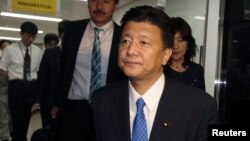TOKYO —
A Japanese cabinet member visited Yasukuni Shrine Wednesday, pouring salt on a fresh wound after Prime Minister Shinzo Abe's pilgrimage there last week drew sharp criticism from China and South Korea. The shrine is seen by critics as a symbol of Tokyo's wartime aggression.
Internal Affairs Minister Yoshitaka Shindo said he thought his visit to the shrine was unlikely to become a diplomatic issue, Kyodo news agency reported.
Beijing and Seoul have repeatedly expressed anger over politicians' visits to Yasukuni, where Japanese leaders convicted as war criminals by an Allied tribunal after WWII are honored alongside those who died in battle.
Both China and Korea suffered under Japanese rule, with parts of China occupied from the 1930s and Korea colonized from 1910 to 1945. Japanese leaders have apologized in the past, but many in China and South Korea doubt the sincerity of the apologies, partly because of contradictory remarks by politicians.
Underscoring the deteriorating ties between Asia's two biggest economies, China said its leaders would not meet Abe after he visited Yasukuni on Thursday. Abe’s visit was the first by a serving Japanese prime minister since 2006.
A commentary in China's ruling Communist Party's top newspaper called Abe's actions a threat to peace in the region.
“Abe paying homage at the Yasukuni Shrine is an offensive, open provocation, and announces to the world his old imperial dreams. The international community must strike back strongly and be on guard for the ashes of Japan's militarism to reignite,” the paper said.
Ties between Japan and China were already precarious due to a simmering row over ownership of a group of uninhabited islands in the East China Sea.
China has said it is willing to talk to Japan about the issue, but has accused Abe of not being serious about wanting to resolve the dispute.
Abe, a staunch conservative, has called for dialog with China since returning to power a year ago, but Beijing had shown no inclination to respond to those overtures, even before the latest Yasukuni controversy.
Experts see his visit as an attempt to recast Japan's wartime past in a less apologetic light and revive national pride.
Internal Affairs Minister Yoshitaka Shindo said he thought his visit to the shrine was unlikely to become a diplomatic issue, Kyodo news agency reported.
Beijing and Seoul have repeatedly expressed anger over politicians' visits to Yasukuni, where Japanese leaders convicted as war criminals by an Allied tribunal after WWII are honored alongside those who died in battle.
Both China and Korea suffered under Japanese rule, with parts of China occupied from the 1930s and Korea colonized from 1910 to 1945. Japanese leaders have apologized in the past, but many in China and South Korea doubt the sincerity of the apologies, partly because of contradictory remarks by politicians.
Underscoring the deteriorating ties between Asia's two biggest economies, China said its leaders would not meet Abe after he visited Yasukuni on Thursday. Abe’s visit was the first by a serving Japanese prime minister since 2006.
A commentary in China's ruling Communist Party's top newspaper called Abe's actions a threat to peace in the region.
“Abe paying homage at the Yasukuni Shrine is an offensive, open provocation, and announces to the world his old imperial dreams. The international community must strike back strongly and be on guard for the ashes of Japan's militarism to reignite,” the paper said.
Ties between Japan and China were already precarious due to a simmering row over ownership of a group of uninhabited islands in the East China Sea.
China has said it is willing to talk to Japan about the issue, but has accused Abe of not being serious about wanting to resolve the dispute.
Abe, a staunch conservative, has called for dialog with China since returning to power a year ago, but Beijing had shown no inclination to respond to those overtures, even before the latest Yasukuni controversy.
Experts see his visit as an attempt to recast Japan's wartime past in a less apologetic light and revive national pride.









